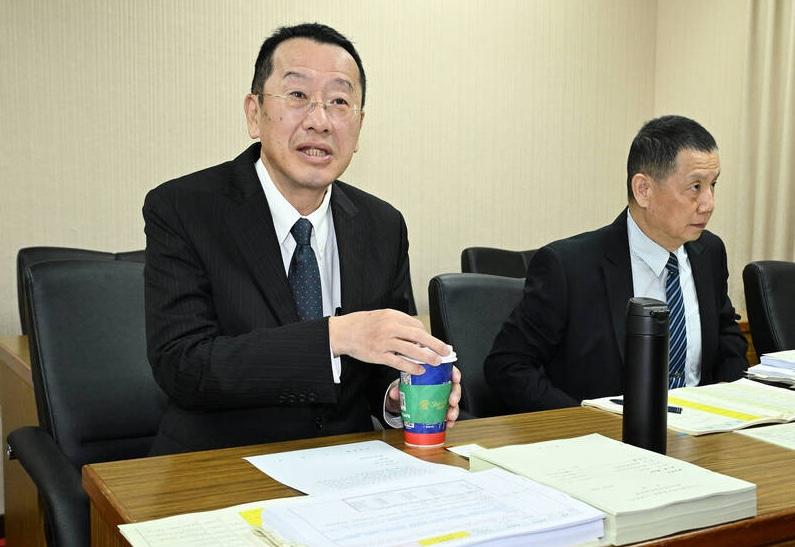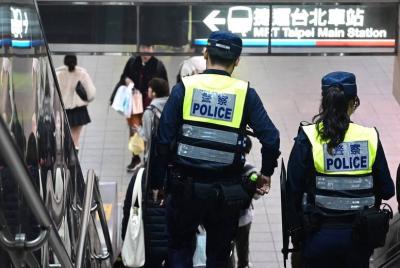If the national defense budget for the submarine construction project is cut next year, the earliest the budget for the Hai Kun (海鯤) submarine could be allocated is 2026, with its implementation delayed until 2027, Minister of National Defense Wellington Koo (顧立雄) said today.
The Legislative Yuan’s Foreign and National Defense Committee is reviewing next year’s national defense budget today and tomorrow, including the submarine construction project under the Indigenous Defense Submarine Program.
This program has a total proposed cost exceeding NT$284 billion (US$7.62 billion), with NT$1.9 billion to be allocated next year.

Photo: Liao Chen-huei, Taipei Times
However, Chinese Nationalist Party (KMT) legislators Ma Wen-chun (馬文君), Huang Jen (黃仁) and Hsu Chiao-hsin (徐巧芯) have proposed to cut the submarine budget.
The Ministry of National Defense has been communicating with the legislators that the budget would not be utilized until the prototype submarine passes its sea trials, Koo said.
As the sea trials are not expected to be completed until September next year, Koo said he hopes this would encourage legislators to pass the budget now.
If the budget does not pass, not only would the timeline be delayed, but subcontractors would question Taiwan’s commitment to constructing the submarine, Koo said.
The ministry expects to engage with subcontractors and prepare relevant materials next year, he said.
Any delay would significantly impact the Indigenous Defense Submarine Program and efforts to enhance Taiwan’s defense capabilities, he added.
Reporters also inquired about comments from US academics suggesting that the ministry is not transparent enough in reporting China’s military activities near Taiwan.
While the ministry aims to be as transparent as possible, saying too much could reveal information about Taiwan’s surveillance and intelligence capabilities, which would further expose them to China, Koo said.
This is a dilemma that the ministry would continue to review, he added.

Beijing could eventually see a full amphibious invasion of Taiwan as the only "prudent" way to bring about unification, the US Department of Defense said in a newly released annual report to Congress. The Pentagon's "Annual Report to Congress: Military and Security Developments Involving the People's Republic of China 2025," was in many ways similar to last year’s report but reorganized the analysis of the options China has to take over Taiwan. Generally, according to the report, Chinese leaders view the People's Liberation Army's (PLA) capabilities for a Taiwan campaign as improving, but they remain uncertain about its readiness to successfully seize

Taiwan is getting a day off on Christmas for the first time in 25 years. The change comes after opposition parties passed a law earlier this year to add or restore five public holidays, including Constitution Day, which falls on today, Dec. 25. The day marks the 1947 adoption of the constitution of the Republic of China, as the government in Taipei is formally known. Back then the Chinese Nationalist Party (KMT) governed China from Nanjing. When the KMT, now an opposition party in Taiwan, passed the legislation on holidays, it said that they would help “commemorate the history of national development.” That

Taiwan has overtaken South Korea this year in per capita income for the first time in 23 years, IMF data showed. Per capita income is a nation’s GDP divided by the total population, used to compare average wealth levels across countries. Taiwan also beat Japan this year on per capita income, after surpassing it for the first time last year, US magazine Newsweek reported yesterday. Across Asia, Taiwan ranked fourth for per capita income at US$37,827 this year due to sustained economic growth, the report said. In the top three spots were Singapore, Macau and Hong Kong, it said. South

Police today said they are stepping up patrols throughout the Taipei MRT system, after a social media user threatened to detonate a bomb at an unspecified station this afternoon. Although they strongly believe the threat to be unsubstantiated, Taipei Metro police and the Railway Police Bureau still said that security and patrols would be heightened through the system. Many copycat messages have been posted since Friday’s stabbing attacks at Taipei Main Station and near Zhongshan MRT Station that left three dead and 11 injured, police said. Last night, a Threads user in a post said they would detonate a bomb on the Taipei